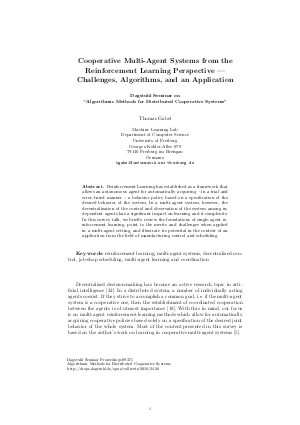Cooperative Multi-Agent Systems from the Reinforcement Learning Perspective – Challenges, Algorithms, and an Application
Author Thomas Gabel
-
Part of:
Volume:
Dagstuhl Seminar Proceedings, Volume 9371
Part of: Series: Dagstuhl Seminar Proceedings (DagSemProc) - License:
 Creative Commons Attribution 4.0 International license
Creative Commons Attribution 4.0 International license
- Publication Date: 2010-04-22
File

PDF
DagSemProc.09371.2.pdf
- Filesize: 85 kB
- 5 pages
Document Identifiers
Subject Classification
Keywords
- Multi-agent reinforcement learning
- decentralized control
- job-shop scheduling
Metrics
- Access Statistics
-
Total Accesses (updated on a weekly basis)
0Document
0Metadata
Abstract
Reinforcement Learning has established as a framework that allows an autonomous agent for automatically acquiring – in a trial and error-based manner – a behavior policy based on a specification of the desired behavior of the system. In a multi-agent system, however, the decentralization of the control and observation of the system among independent agents has a significant impact on learning and it complexity. In this survey talk, we briefly review the foundations of single-agent reinforcement learning, point to the merits and challenges when applied in a multi-agent setting, and illustrate its potential in the context of an application from the field of manufacturing control and scheduling.
Cite As Get BibTex
Thomas Gabel. Cooperative Multi-Agent Systems from the Reinforcement Learning Perspective – Challenges, Algorithms, and an Application. In Algorithmic Methods for Distributed Cooperative Systems. Dagstuhl Seminar Proceedings, Volume 9371, pp. 1-5, Schloss Dagstuhl – Leibniz-Zentrum für Informatik (2010)
https://doi.org/10.4230/DagSemProc.09371.2
BibTex
@InProceedings{gabel:DagSemProc.09371.2,
author = {Gabel, Thomas},
title = {{Cooperative Multi-Agent Systems from the Reinforcement Learning Perspective – Challenges, Algorithms, and an Application}},
booktitle = {Algorithmic Methods for Distributed Cooperative Systems},
pages = {1--5},
series = {Dagstuhl Seminar Proceedings (DagSemProc)},
ISSN = {1862-4405},
year = {2010},
volume = {9371},
editor = {S\'{a}ndor Fekete and Stefan Fischer and Martin Riedmiller and Suri Subhash},
publisher = {Schloss Dagstuhl -- Leibniz-Zentrum f{\"u}r Informatik},
address = {Dagstuhl, Germany},
URL = {https://drops.dagstuhl.de/entities/document/10.4230/DagSemProc.09371.2},
URN = {urn:nbn:de:0030-drops-24265},
doi = {10.4230/DagSemProc.09371.2},
annote = {Keywords: Multi-agent reinforcement learning, decentralized control, job-shop scheduling}
}
